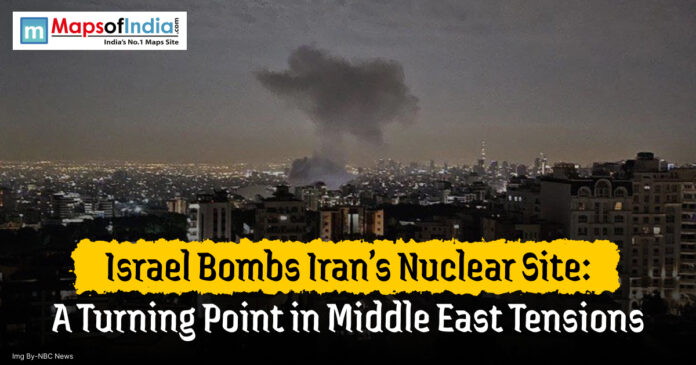Introduction
This is a bombshell news story that is shaking the political and diplomatic circles of the world. Israel has allegedly bombed the nuclear facility in Iran in a precision strike. It is a high stakes military action which has shown a new chapter to the long standing rivalry between the two nations and raises urgent questions regarding the future of nuclear diplomacy, regional security and overall geopolitical balance in the Middle East.
Code-named Operation Prometheus, the attack was carried out during the cover of darkness to disable uranium enrichment facilities of Iran, one of the pillars of the controversial nuclear program of Tehran. Though Israel has not yet confirmed or denied its part in the attack, various sources in the intelligence and media world have given credit of the attack to the defense establishment of Tel Aviv. With tempers flaring, the globe is paying keen attention in the fear of a full-blown war.
Background: A Tense Relationship Decades in the Making
In order to realize the seriousness of the escalation at hand, it is necessary to look into the history that drives it. Israel and Iran have been opponents since the Islamic Revolution of 1979 in Iran. Before that, the relations between the two countries were rather cooperative. But shortly after the ascendancy of theocratic leadership in Tehran, Israel was soon declared an enemy.
The fact that Iran has been supporting anti-Israel forces like Hezbollah as well as Hamas, the rhetoric against the Jewish state, and the alleged nuclear weapon ambitions has kept the pot simmering. In its turn, Israel has been taking regular measures to make sure that Iran does not gain nuclear capabilities, since the latter is regarded as an existential threat.
Israeli leaders have, over the years, issued warnings that they will not permit Iran to develop a nuclear bomb at any rate. Such warnings have been supported with undercover activities, computer attacks (such as the notorious Stuxnet computer virus), acts of sabotage and even the targeted killing of Iranian nuclear scientists. The newest bombing however, is one of the most brazen and open actions in this shadow war.
The Attack: What Happened?
The international media and satellite imagery experts reported that the Israeli Air Force fired precision-guided munitions on a nuclear plant situated near Natanz, which is a key installation in the Iranian uranium enrichment program. The operation, which was speculated to have been conducted by stealth aircraft and electronic jamming systems, targeted underground bunkers and centrifuge halls.
Witnesses told of hearing loud explosions and of power outages in nearby neighbourhoods. State media in Iran confirmed that the facility had been damaged “heavily”, but subsequent reports played down the damage, saying there were no casualties and that the nuclear program would go on. But independent analysts and leakage of reports hint otherwise- that Iran is several months, or even years, behind in its enrichment schedule.
Iran’s Reaction: Rage and Resolve
Iranian officials hurried to denounce the bombing as an “act of terrorism” and contrary to international law. In response, the Iranian Foreign Minister threatened to retaliate hard, saying that Israel will regret this aggression greatly.
Iran increased its diplomatic effort in the days after the strike, seeking the support of its allies and urging an emergency session of the United Nations Security Council. The Iranian military command as well put its air defense on alert and there were rumors of possible missile placements in the area around the Strait of Hormuz – through which a large portion of world oil supplies pass.
The storyline of Tehran is unrepentant: the nuclear program, according to them, is purely peaceful and directed towards medical and energy demands. The absence of transparency and limits on the inspections by the International Atomic Energy Agency (IAEA) however, remain causes of suspicion in the world.
Israel’s Silence: Strategic Ambiguity or Calculated Messaging?
Israel has not formally claimed responsibility for the bombing much like many of its military actions in the past. This strategic ambiguity policy enables it to have its security goals without necessarily incurring direct diplomatic consequences. But unnamed Israeli officials have suggested the success of the operation and the need to “protect the national security of Israel by all means.”
Red lines have been circling around Iran nuclear ambitions in the past speeches by the Israeli Prime Minister and this strike seems like a direct implementation of the policy. Military analysts reckon that Israel was pushed to act now by intelligence that the program in Iran had reached a very sensitive stage- perhaps on the verge of producing weapons grade uranium.
Global Reaction: Alarm Bells and Calls for Restraint
The global community has reacted with both anxiety and reservation. The US, the biggest ally of Israel, requested calm and stressed on the need of diplomacy. Although Washington is as concerned as Tel Aviv about a nuclear armed Iran, it suspects that these unilateral military actions might spoil the fragile diplomatic talks.
The bombing was condemned by Russia and China who have strategic interests with Iran and requested an investigation by the UN. The European Union said it was deeply worried and urged an immediate dialogue to de-escalate the situation.
In the meantime, the oil markets showed a quick response, and the crude prices jumped on the concerns of the possible disturbance in the Gulf. Investors as well as analysts are concerned that such a prolonged face-off can disrupt global energy supplies and cause shocks to the already weak economies.
Regional Implications: A Powder Keg Ready to Ignite
The Middle East, already marred with war and political unrest, is tense. Our allies in Lebanon, Syria, Iraq and Yemen have threatened potential coordinated actions by Iran. Particularly, Hezbollah has deployed more military preparedness along the northern border of Israel.
The Arab countries that have already normalized their relations with Israel as a part of the Abraham Accords, including the UAE and Bahrain, are in a tricky situation. They also don’t trust Iran, just like Israel, but they are being very careful not to appear as if they support any kind of war. So far, their statements have been cautious, asking both sides to calm down and avoid fighting.
Then there’s the matter of Turkey and Saudi Arabia. Both are strong and important countries in the region, but they have different goals and interests, which makes the situation even more complex.
The Nuclear Question: What Now?
The attack has considerably damaged the nuclear program of Iran, at least on a short-term basis. But it can also prompt Iran to further fortify its facilities, enrich more uranium and pull out whatever nuclear monitoring arrangements that still exist.
Diplomatic mechanisms like the Joint Comprehensive Plan of Action (JCPOA), which had already been undermined by years of mistrust and non-compliance, are now left on a thin thread. The new realities on the ground, such as Iranian demand for security guarantees and Israeli demand for preventive strikes, will have to be dealt with in any future negotiation.
According to some analysts, the strike might be a needed wake-up call, and both parties will go back to the table. Others are afraid that it might have killed any chances of a peaceful resolution forever.
Conclusion: Standing on the Edge
Israel’s bombing of the nuclear site in Iran is not just a military exercise, but it is a gamble of the highest stakes that will define what will happen in the Middle East. It could result in a disastrous war in the region or a new wave of diplomacy, depending on how things go.
What can be said, though, is that the volatility between these two nations can no longer be ignored by the world. With the dust having settled and governments considering their options, one fact is apparent — a new and dangerous phase is being ushered in the geopolitics of the Middle East.
Millions of innocent civilians and the peace of the world need restraint, wisdom, and international interactions more than ever.




